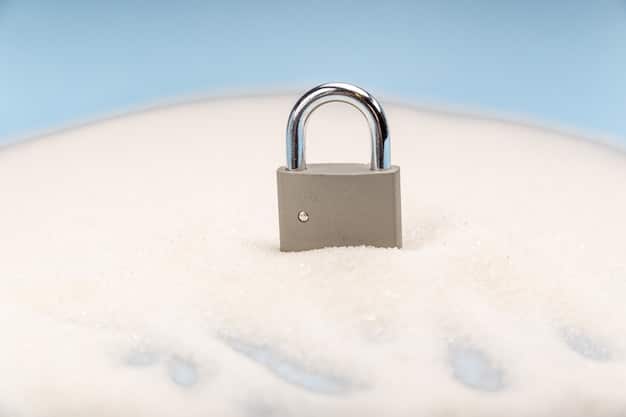Peru Data Privacy: A US Business Guide to New Regulations

Understanding Peru’s New Regulations on Data Privacy is crucial for US businesses operating in or interacting with Peruvian markets, ensuring compliance and preventing legal repercussions.
Navigating the complexities of international data privacy laws can be daunting. For US businesses operating in Peru or handling data of Peruvian citizens, Understanding Peru’s New Regulations on Data Privacy: A Guide for US Businesses is essential. This guide unpacks the key aspects of these regulations, offering insights to ensure your business remains compliant and avoids potential penalties.
Understanding Peru’s Data Privacy Landscape
Peru has been steadily strengthening its data privacy laws to align with international standards and protect its citizens’ personal information. Understanding the framework within which these laws operate is the first step for any US business aiming to comply.
These regulations are not just a formality but a critical aspect of doing business responsibly and legally in Peru.
Key Legislations Governing Data Privacy in Peru
Several key pieces of legislation form the backbone of data privacy in Peru. These laws outline the rights of individuals concerning their data and the responsibilities of organizations that handle such data.
- Law No. 29733, Personal Data Protection Law: This is the primary law governing data protection in Peru. It establishes the general principles, rights, and obligations related to the processing of personal data.
- Supreme Decree No. 003-2013-JUS, Regulations of the Personal Data Protection Law: This decree provides detailed guidance on the implementation of Law No. 29733, clarifying various aspects such as data collection, storage, and transfer.
- Sector-Specific Regulations: Certain sectors, such as healthcare and finance, may have additional regulations that apply to data privacy.
Understanding these legislations is crucial for US businesses, as they dictate how personal data can be collected, processed, and stored within Peru.

Scope and Applicability to US Businesses
The Peruvian data privacy laws have a broad scope, potentially affecting any US business that processes the personal data of individuals located in Peru. This includes:
- Businesses with a physical presence in Peru: If your company has an office, branch, or subsidiary in Peru, you are directly subject to Peruvian data privacy laws.
- Businesses offering goods or services to individuals in Peru: Even without a physical presence, if you actively target Peruvian customers, you must comply with these regulations.
- Businesses processing data of Peruvian citizens: If you collect or process data of individuals who are located in Peru, regardless of their nationality, you are likely subject to these laws.
It’s important for US businesses to assess their activities and determine whether they fall within the scope of Peruvian data privacy laws.
In conclusion, understanding Peru’s data privacy landscape is crucial for compliance and responsible business practices.
Key Principles of Peru’s Data Privacy Law
Peru’s Personal Data Protection Law is built upon several core principles that guide the lawful processing of personal data. These principles are fundamental to understanding your obligations under the law.
Adhering to these principles not only ensures compliance but also fosters trust with your Peruvian customers.
Informed Consent
One of the most critical principles is obtaining informed consent from individuals before collecting and processing their personal data. This means providing clear and transparent information about:
- The purpose for which the data is being collected.
- The types of data being collected.
- Who will have access to the data.
- How the data will be used.
- The rights of the data subject.
Consent must be freely given, specific, informed, and unambiguous. Pre-ticked boxes or ambiguous language should be avoided.
Purpose Limitation
Data should only be collected for specified, explicit, and legitimate purposes and not further processed in a manner incompatible with those purposes.
This requires defining the purpose of data collection upfront and limiting its use to that purpose. If you wish to use the data for a new purpose, you must obtain fresh consent.
Data Minimization
Only collect data that is adequate, relevant, and limited to what is necessary for the purposes for which it is processed.
Avoid collecting excessive or unnecessary data. Regularly review the data you hold and delete any data that is no longer needed.

Data Security
Implement appropriate technical and organizational measures to protect personal data against unauthorized access, use, disclosure, alteration, or destruction.
This includes measures such as:
- Encryption.
- Access controls.
- Regular security assessments.
- Data breach response plans.
Data Accuracy
Ensure that personal data is accurate and, where necessary, kept up to date. Take reasonable steps to rectify or erase inaccurate data.
This requires implementing procedures for data validation and correction.
In summary, adherence to these key principles is paramount for compliance with Peru’s data privacy law.
Practical Steps for US Businesses to Ensure Compliance
Ensuring compliance with Peru’s data privacy laws requires a proactive and systematic approach. Here are some practical steps US businesses can take to protect personal data and avoid potential penalties.
Taking these steps will not only ensure compliance but also build trust with your Peruvian customers and partners.
Conduct a Data Privacy Audit
The first step is to conduct a thorough audit of your data processing activities. This involves:
- Identifying what personal data you collect.
- Where the data comes from.
- How the data is processed.
- Who has access to the data.
- Where the data is stored.
This audit will help you understand your current data privacy practices and identify any gaps in compliance.
Update Your Privacy Policies
Your privacy policies should be clear, concise, and easy to understand. They should explain:
- What personal data you collect.
- Why you collect it.
- How you use it.
- With whom you share it.
- How individuals can exercise their rights.
Ensure that your privacy policies are accessible in Spanish.
Implement Data Security Measures
Implement appropriate technical and organizational measures to protect personal data, such as:
- Encryption.
- Access controls.
- Firewalls.
- Intrusion detection systems.
- Data loss prevention systems.
Regularly review and update your security measures to address evolving threats.
Train Your Employees
Provide regular training to your employees on data privacy principles and practices. This should cover:
- The importance of data privacy.
- Their responsibilities under the law.
- How to handle personal data securely.
- How to respond to data privacy requests.
Make sure employees understand the consequences of non-compliance.
Establish a Data Breach Response Plan
Develop a comprehensive data breach response plan that outlines the steps you will take in the event of a data breach. This plan should include:
- Identifying the relevant stakeholders.
- Assessing the impact of the breach.
- Notifying the relevant authorities and affected individuals.
- Taking steps to contain and remediate the breach.
Regularly test and update your data breach response plan.
By implementing these practical steps, US businesses can significantly improve their compliance with Peru’s data privacy laws.
Cross-Border Data Transfers to the US
Transferring personal data from Peru to the United States is a complex area that requires careful consideration. Peruvian law imposes restrictions on cross-border data transfers to ensure that personal data is adequately protected.
Understanding these restrictions is crucial for US businesses that receive data from their Peruvian operations or partners.
Adequacy Requirement
Peruvian law requires that the recipient country provide an adequate level of data protection. While the US does not have a comprehensive federal data privacy law, there are mechanisms that can be used to demonstrate adequacy.
Standard Contractual Clauses (SCCs)
One of the most common mechanisms for ensuring adequate protection is to use Standard Contractual Clauses (SCCs). These are pre-approved contractual terms that impose data protection obligations on the data importer (the US business).
The SCCs provide a legal basis for the transfer and ensure that the data is protected in accordance with Peruvian law.
Binding Corporate Rules (BCRs)
Multinational companies can also use Binding Corporate Rules (BCRs) to facilitate cross-border data transfers. BCRs are a set of internal rules that are approved by a data protection authority and that apply to all entities within the corporate group.
BCRs provide a framework for ensuring that personal data is protected throughout the organization.
Derogations
In certain limited circumstances, data transfers may be permitted without an adequacy decision or appropriate safeguards, such as:
- The data subject has explicitly consented to the transfer.
- The transfer is necessary for the performance of a contract with the data subject.
- The transfer is necessary for the establishment, exercise, or defense of legal claims.
However, these derogations should be used sparingly and only when no other mechanism is available.
Due Diligence
US businesses should conduct due diligence on their Peruvian counterparts to ensure that they are complying with Peruvian data privacy laws. This includes:
- Reviewing their data privacy policies.
- Assessing their data security measures.
- Obtaining assurances that they will comply with the requirements for cross-border data transfers.
This due diligence will help you minimize the risk of data breaches and legal liabilities.
In conclusion, US businesses must carefully consider the requirements for cross-border data transfers when receiving personal data from Peru.
Enforcement and Penalties for Non-Compliance
Failure to comply with Peru’s data privacy laws can result in significant penalties and reputational damage. Understanding the enforcement mechanisms and potential consequences of non-compliance is crucial for US businesses.
Compliance is not only a legal obligation but also a matter of ethical business practice.
Enforcement Authority
The primary authority responsible for enforcing data privacy laws in Peru is the National Authority for Personal Data Protection (ANPDP).
The ANPDP has the power to:
- Investigate complaints of data privacy violations.
- Conduct audits of data processing activities.
- Issue sanctions for non-compliance.
Types of Penalties
The ANPDP can impose a range of penalties for non-compliance, including:
- Warnings: A formal notice to cease the infringing behavior.
- Fines: Monetary penalties that can be significant, depending on the severity of the violation.
- Corrective measures: Requirements to implement specific measures to remedy the non-compliance.
- Suspension or revocation of data processing activities: Temporary or permanent bans on processing personal data.
Calculating Fines
The amount of the fine will depend on several factors, including:
- The nature and severity of the violation.
- The number of individuals affected.
- The intentionality of the violation.
- The economic gain obtained as a result of the violation.
Fines can range from several thousand to hundreds of thousands of US dollars.
Reputational Damage
In addition to financial penalties, non-compliance can also result in significant reputational damage. This can lead to:
- Loss of customer trust.
- Damage to brand reputation.
- Difficulty attracting and retaining customers.
Protecting data privacy is essential for maintaining a positive reputation and building long-term relationships with customers.
Legal Recourse for Individuals
Individuals who have suffered damages as a result of a data privacy violation have the right to seek legal recourse. This includes:
- Filing a complaint with the ANPDP.
- Bringing a lawsuit for compensation.
US businesses should be prepared to respond to data privacy complaints and legal claims.
In summary, the consequences of non-compliance with Peru’s data privacy laws can be severe, both financially and reputationally. US businesses should take proactive steps to ensure compliance and protect the personal data of Peruvian citizens.
Future Trends in Peruvian Data Privacy Regulations
The landscape of data privacy is constantly evolving, and Peru is expected to continue strengthening its regulations in the coming years. Staying informed about these future trends is crucial for US businesses that operate in or interact with Peru.
Proactive adaptation to these trends will ensure continued compliance and maintain a competitive edge.
Alignment with GDPR
Peru is likely to continue aligning its data privacy laws with the European Union’s General Data Protection Regulation (GDPR). This may include:
- Strengthening the requirements for consent.
- Expanding the rights of data subjects.
- Increasing the penalties for non-compliance.
US businesses that are already compliant with GDPR will be well-positioned to adapt to these changes.
Increased Focus on Cybersecurity
With the increasing threat of cyberattacks, Peru is likely to place greater emphasis on cybersecurity measures to protect personal data.
This may include:
- Mandatory data breach notification requirements.
- Increased scrutiny of data security practices.
- Requirements to implement specific cybersecurity measures.
Regulation of Emerging Technologies
Peru is also likely to begin regulating emerging technologies such as artificial intelligence (AI) and the Internet of Things (IoT) from a data privacy perspective.
This may include:
- Rules governing the collection and use of data by AI systems.
- Requirements to ensure the security of IoT devices.
- Limits on the use of facial recognition technology.
Enhanced Enforcement
The ANPDP is likely to increase its enforcement efforts in the coming years, conducting more audits and imposing more penalties for non-compliance.
US businesses should be prepared for increased scrutiny and be proactive in ensuring compliance.
Public Awareness Campaigns
The Peruvian government is likely to launch public awareness campaigns to educate citizens about their data privacy rights.
This will empower individuals to exercise their rights and hold organizations accountable for non-compliance.
In conclusion, US businesses should monitor the evolving data privacy landscape in Peru and take proactive steps to adapt to future trends. This will ensure continued compliance and maintain a competitive edge.
| Key Aspect | Brief Description |
|---|---|
| 🔑 Informed Consent | Obtain explicit consent before collecting and processing personal data. |
| 🛡️ Data Security | Implement measures to protect personal data against unauthorized access. |
| 🌐 Cross-Border Transfers | Ensure adequate data protection when transferring data outside Peru. |
| ⚠️ Non-Compliance | Be aware of penalties for violating data privacy laws. |
Frequently Asked Questions (FAQ)
▼
Personal data encompasses any information that can identify an individual, such as name, address, email, ID number, and biometric data. It also includes sensitive data like health and financial information.
▼
Generally, yes. Even for employee data, obtaining informed consent is necessary unless the processing is essential for the employment contract or required by law. Transparency is crucial.
▼
In case of a data breach, promptly assess the scope, contain the breach, notify affected parties and the ANPDP as required by law, and implement corrective measures to prevent recurrence.
▼
Privacy policies should be reviewed and updated regularly, especially when there are changes in data processing activities, new regulations, or significant events like a data breach. Aim for at least annually.
▼
Yes, marketing data requires explicit consent before collection and processing. Individuals must have the right to opt-out easily. The purpose of marketing should be clearly communicated.
Conclusion
Understanding and complying with Peru’s new data privacy regulations is crucial for US businesses. By following the guidelines outlined in this guide, businesses can ensure they respect the privacy rights of Peruvian citizens, avoid potential penalties, and maintain a positive business reputation. Staying informed and proactive is key to navigating this evolving legal landscape.





